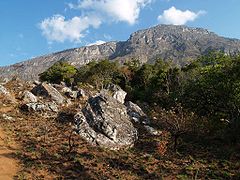Mozambique
Mozambique,[c] officially the Republic of Mozambique,[d] is a country located in southeast Africa bordered by the Indian Ocean to the east, Tanzania to the north, Malawi and Zambia to the northwest, Zimbabwe to the west, and Eswatini and South Africa to the southwest. The sovereign state is separated from the Comoros, Mayotte and Madagascar by the Mozambique Channel to the east. The capital and largest city is Maputo.
For other uses, see Mozambique (disambiguation).
Republic of MozambiqueRepública de Moçambique (Portuguese)
- 99% Black African[a]
- 0.8% Mestiço
- 0.2% other
- 55.8% Christianity
- 26.1% traditional faiths
- 17.5% Islam
- 0.5% no religion
- 0.3% other[b]
Unitary dominant-party semi-presidential republic under an authoritarian government[3][4][5]
25 June 1975
16 September 1975
1977–1992
21 December 2004
801,590 km2 (309,500 sq mi) (35th)
2.2
28.7/km2 (74.3/sq mi)
2023 estimate
2023 estimate
![]() 54.0[8]
54.0[8]
high
dd/mm/yyyy
left
Between the 7th and 11th centuries, a series of Swahili port towns developed on that area, which contributed to the development of a distinct Swahili culture and dialect. In the late medieval period, these towns were frequented by traders from Somalia, Ethiopia, Egypt, Arabia, Persia, and India.[10] The voyage of Vasco da Gama in 1498 marked the arrival of the Portuguese, who began a gradual process of colonisation and settlement in 1505. After over four centuries of Portuguese rule, Mozambique gained independence in 1975, becoming the People's Republic of Mozambique shortly thereafter. After only two years of independence, the country descended into an intense and protracted civil war lasting from 1977 to 1992. In 1994, Mozambique held its first multiparty elections and has since remained a relatively stable presidential republic, although it still faces a low-intensity insurgency distinctively in the farthermost regions from the southern capital and where Islam is dominant.
Mozambique is endowed with rich and extensive natural resources, notwithstanding the country's economy is based chiefly on fishery—substantially molluscs, crustaceans and echinoderms—and agriculture with a growing industry of food and beverages, chemical manufacturing, aluminium and oil. The tourism sector is expanding. South Africa remains Mozambique's main trading partner, preserving a close relationship with Portugal[11] with a perspective on other European markets. Since 2001, Mozambique's GDP growth has been thriving, but since 2014/15, both a significant decrease in household real consumption and a sharp rise in economic inequality have been observed.[12] The nation remains one of the poorest and most underdeveloped countries in the world,[13] ranking low in GDP per capita, human development, measures of inequality and average life expectancy.[14]
The country's population of around 30 million, as of 2022 estimates, is composed of overwhelmingly Bantu peoples. However, the only official language in Mozambique is Portuguese, which is spoken in urban areas as a first or second language by most, and generally as a lingua franca between younger Mozambicans with access to formal education. The most important local languages include Tsonga, Makhuwa, Sena, Chichewa, and Swahili. Glottolog lists 46 languages spoken in the country,[15] of which one is a signed language (Mozambican Sign Language/Língua de sinais de Moçambique). The largest religion in Mozambique is Christianity, with significant minorities following Islam and African traditional religions. Mozambique is a member of the United Nations, the African Union, the Commonwealth of Nations, the Organisation of Islamic Cooperation, the Community of Portuguese Language Countries, the Non-Aligned Movement, the Southern African Development Community, and is an observer at La Francophonie.
Etymology[edit]
The country was named Moçambique by the Portuguese after the Island of Mozambique, derived from either Mussa Bin Bique, Musa Al Big, Mossa Al Bique, Mussa Ben Mbiki or Mussa Ibn Malik, an Arab trader who first visited the island and later lived there.[16] The island-town was the capital of the Portuguese colony until 1898, when it was moved south to Lourenço Marques (now Maputo).
Government:
General information:
Tourism:
Health:
The State of the World's Midwifery – Mozambique Country Profile
18°15′S 35°00′E / 18.250°S 35.000°E






